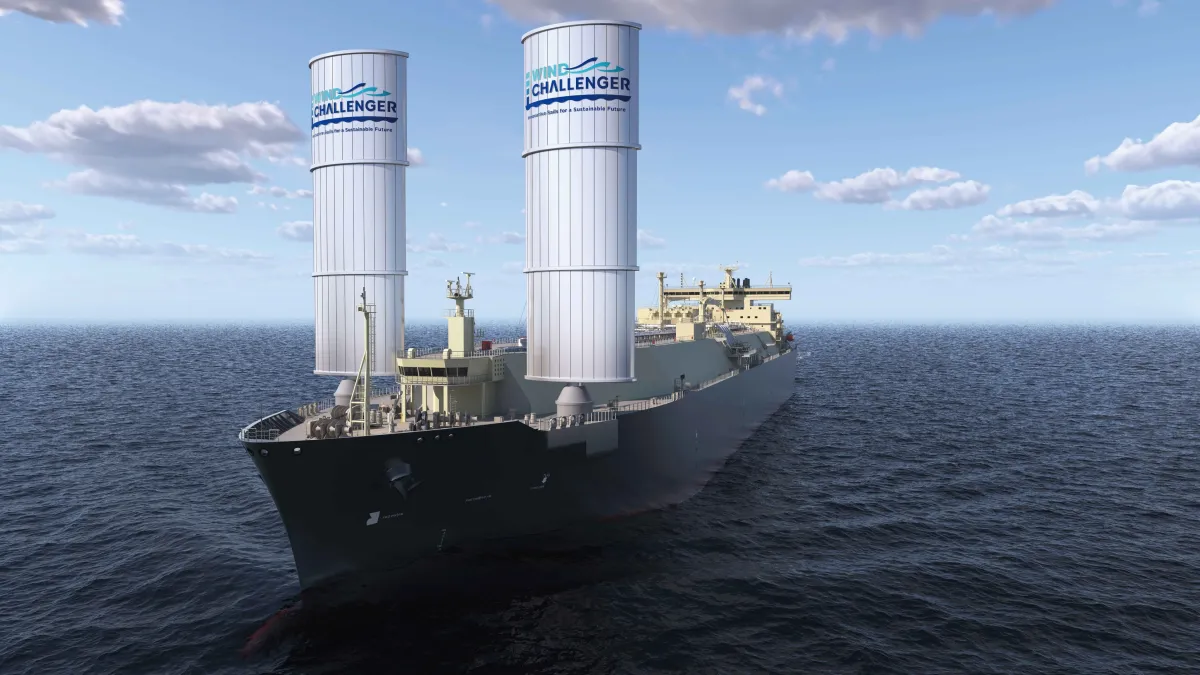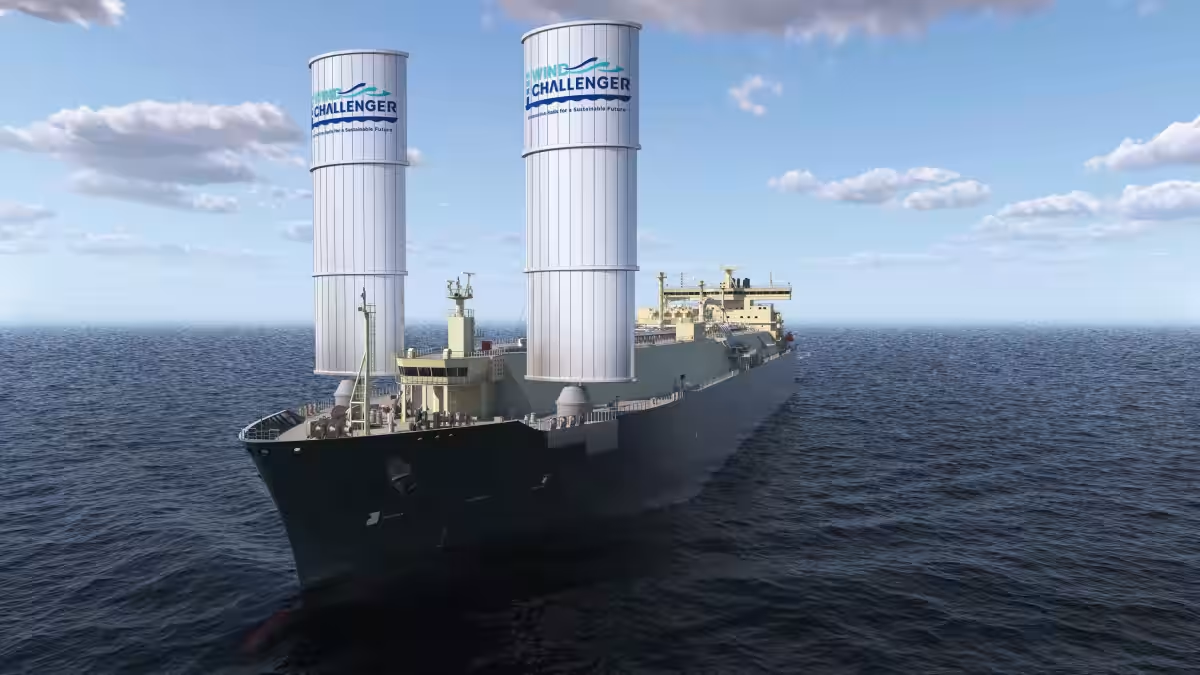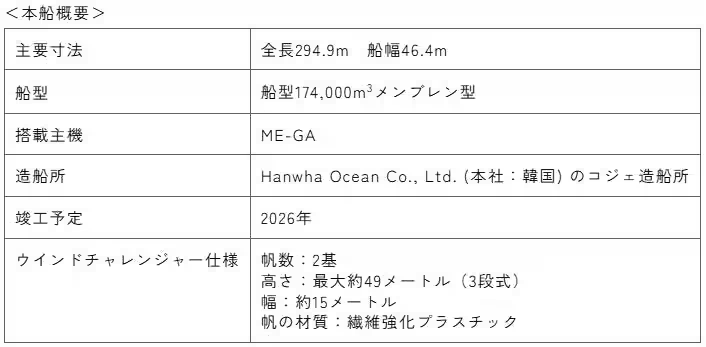

MOL to Equip New LNG Carrier with Wind Challenger for Tokyo Gas
In a significant advancement towards greener maritime transport, Mitsui O.S.K. Lines (MOL) has reached an agreement with Tokyo LNG Tanker Co., a wholly-owned subsidiary of Tokyo Gas, to equip a new liquefied natural gas (LNG) carrier with two Wind Challenger systems. This pioneering move marks the second instance globally where Wind Challenger technology, designed to complement traditional propulsion systems with wind power, will be utilized on an LNG carrier.
The collaboration, announced on March 5, 2024, aims at enhancing the energy efficiency of the LNG carrier while reducing both fuel consumption and greenhouse gas emissions. The Wind Challenger system, known for its retractable sail mechanism, allows the vessel to harness wind energy, which minimizes reliance on fossil fuels and aligns with global sustainability initiatives.
MOL’s commitment to reducing environmental impact in the transportation of LNG, a commodity witnessing growing global demand, is evident in this project. As the world's largest LNG ship owner, MOL strives to contribute actively to the realization of a decarbonized society. The inclusion of the Wind Challenger systems on the new LNG carrier is expected to set a precedent for future vessels.
This innovative system is not new to the maritime industry; MOL has already introduced several bulker ships equipped with Wind Challenger technology. As of now, two bulk carriers featuring this system have been completed, with plans for seven additional vessels in the pipeline. These previous deployments demonstrate the effectiveness of Wind Challenger in significantly lowering fuel consumption, achieving reductions of up to 17% in some instances.
The continued implementation of the Wind Challenger technology is aimed at enhancing operational efficiency and sustainability in maritime shipping, especially in an era where environmental regulations are becoming increasingly strict.
MOL's vision is not just limited to LNG carriers but extends to other types of vessels as well. On May 24, 2024, the company announced plans to retrofit existing coal transport ships with Wind Challenger systems, marking another milestone in the integration of wind power in marine operations.
With a commitment to innovation and sustainability, MOL sets itself apart as a leader in adopting environmentally friendly technologies in a sector that has long relied on traditional fuels. The introduction of Wind Challenger systems on this LNG carrier is a critical step in MOL's broader strategy to lead the maritime industry towards a more sustainable future.
As the new LNG carrier prepares for its launch and implementation of the Wind Challenger systems progresses, the maritime community watches closely, eager to see the impact this combination of technology and commitment to sustainability will have on future shipping operations. MOL's endeavors not only aim to meet the rising demand for LNG but also highlight the importance of responsible corporate practices in protecting our planet as the shipping industry evolves in a changing environmental landscape.


The collaboration, announced on March 5, 2024, aims at enhancing the energy efficiency of the LNG carrier while reducing both fuel consumption and greenhouse gas emissions. The Wind Challenger system, known for its retractable sail mechanism, allows the vessel to harness wind energy, which minimizes reliance on fossil fuels and aligns with global sustainability initiatives.
MOL’s commitment to reducing environmental impact in the transportation of LNG, a commodity witnessing growing global demand, is evident in this project. As the world's largest LNG ship owner, MOL strives to contribute actively to the realization of a decarbonized society. The inclusion of the Wind Challenger systems on the new LNG carrier is expected to set a precedent for future vessels.
This innovative system is not new to the maritime industry; MOL has already introduced several bulker ships equipped with Wind Challenger technology. As of now, two bulk carriers featuring this system have been completed, with plans for seven additional vessels in the pipeline. These previous deployments demonstrate the effectiveness of Wind Challenger in significantly lowering fuel consumption, achieving reductions of up to 17% in some instances.
The continued implementation of the Wind Challenger technology is aimed at enhancing operational efficiency and sustainability in maritime shipping, especially in an era where environmental regulations are becoming increasingly strict.
MOL's vision is not just limited to LNG carriers but extends to other types of vessels as well. On May 24, 2024, the company announced plans to retrofit existing coal transport ships with Wind Challenger systems, marking another milestone in the integration of wind power in marine operations.
With a commitment to innovation and sustainability, MOL sets itself apart as a leader in adopting environmentally friendly technologies in a sector that has long relied on traditional fuels. The introduction of Wind Challenger systems on this LNG carrier is a critical step in MOL's broader strategy to lead the maritime industry towards a more sustainable future.
As the new LNG carrier prepares for its launch and implementation of the Wind Challenger systems progresses, the maritime community watches closely, eager to see the impact this combination of technology and commitment to sustainability will have on future shipping operations. MOL's endeavors not only aim to meet the rising demand for LNG but also highlight the importance of responsible corporate practices in protecting our planet as the shipping industry evolves in a changing environmental landscape.


Topics Consumer Products & Retail)










【About Using Articles】
You can freely use the title and article content by linking to the page where the article is posted.
※ Images cannot be used.
【About Links】
Links are free to use.